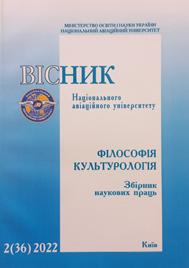ETHNO-CULTURAL FACTOR OF INTER-CIVILIZATIONAL RELATIONS OF THE XX - XXI CENTURIES
DOI:
https://doi.org/10.18372/2412-2157.36.16962Keywords:
civilization, local civilization, ethnicity, mentality, public consciousness, inter-civilizational relationsAbstract
Introduction. Substantiates the relevance of the study of ethno-cultural factor in inter-civilizational relations of the XX-XXI centuries. It is shown that in the process of research the author relies on the works of O. Spengler, A. Toynbee, S. Huntington and other scientists and philosophers who paid considerable attention to this problem. The purpose of the study is to identify the impact of public consciousness, including the mental state of certain cultural communities, on inter-civilizational relations, especially in the late twentieth and early twenty-first decades of the twenty-first century. The methodological basis of the study is outlined: it is substantiated that the most adequate methodological tool in this article is the cultural-historical and socio-cultural methodological approaches, and there are methods of cultural-semantic analysis, comparison, hermeneutic, interdisciplinary. Rresults. One of the fundamental ideas of the article is the conclusion of psychologists W. Wundt and G. Lebon of the turn of the XIX-XX centuries about the mutual influence of different components of psychology and culture of peoples and their mutual intertwining. And also it is shown that the characteristic of civilization depends on the content of ethnic culture, which, in their opinion, is the basis, the foundation of civilization. Based on the analysis of the works of modern researchers, it was concluded that the basis for peaceful or non-peaceful relations between local civilizations is the acceptance of ethno-national cultures in general or their elements that form the corresponding civilizations. In the discussion other grounds of researchers of inter-civilizational relations are considered. In particular, O. Chumakov, A. Vezhbytska, Y. Kharchenko, A. Fabryka, T. Poda. The сonclusions. Show the extraordinary sensitivity of peoples, nations, ethnic groups to the attitude of other peoples, nations and ethnic groups to the achievements of their culture - language, customs, beliefs, patterns of folk behaviour, etc. They are of particular importance in the relations between local civilizations in the late twentieth and early twenty-first centuries, which often become confrontational - up to military actions. In today's saturation of the planet with weapons of mass destruction, it is necessary to show wisdom and good will to preserve peace in the world.
References
Pоdа T. International relations development in cyberspace. Вісник Національного авіаційного університету. Серія: Філософія. Культурологія. Збірник наукових праць. Вип. 1 (33). К. : НАУ, 2021. С. 131-135.
Вежбицька А. Розуміння культур через посередництво ключових слів. М. : Мови слов’янської культури, 2001. 288 с.
Вундт В. Проблеми психології народів. М. : Академ Проект, 2011. 136 с.
Кримський С. Б., Павленко Ю. В. Цивілізаційний розвиток людства. К. : Фенікс, 2007. 316 с.
Кримський С. Б. Про софійність, правду, смисли людського буття. К. : 2010. 464 с.
Лебон Г. Психологія народів і мас. М. : АСТ, 2017. 384 с.
Тойнбі А. Цивілізація перед судом історії. М. : Прогрес, 1996. 480 с.
Фабрика А. А. Американізація глобальної культури в контексті теорії міжнародних відносин. Вісник Національного авіаційного університету. Серія: Філософія. Культурологія. Збірник наукових праць. Вип. 1 (29). К. : НАУ, 2019. С. 150-158.
Хантінгтон С. Зіткнення цивілізацій. М. : АСТ, 2007. 571 с. 10. Харченко Ю. В. Близькодія і дальнодія як сутнісні характеристики взаємодії у площині міжнародних відносин. Вісник Національного авіаційного університету. Серія: Філософія. Культурологія. Збірник наукових праць. Вип. 2 (26). К. : НАУ, 2017. С. 31-34.
Чумаков О. М. Метафізика глобалізації. М. : Проспект, 2017. 496 с.
Шпенглер О. Присмерки Європи. Мн. : Попурі, 1993.


